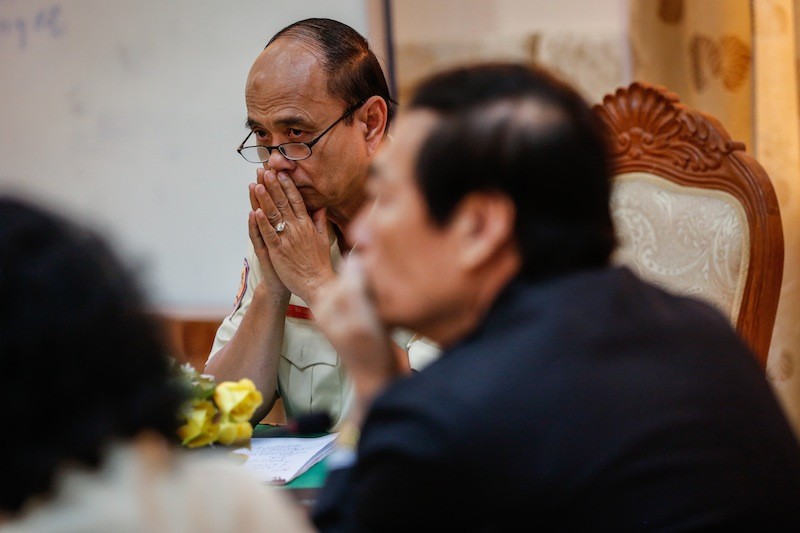Cambodia’s anti-corruption body on Tuesday decided it had jurisdiction over corruption allegations against deputy opposition leader Kem Sokha for making lavish promises to a purported mistress in leaked audio recordings.
Mr. Sokha has remained silent on the scandal since recordings of alleged conversations between him and a mistress started appearing on Facebook early this month. The Anti-Corruption Unit (ACU) said on Tuesday that Mr. Sokha’s failure to deny that the voice in recently leaked audio recording was his was tacit admission that it was.

A leading legal expert, however, questioned the government’s reasoning.
A group of students claiming no political motive or affiliation have asked the ACU to investigate Mr. Sokha over allegations of an affair—illegal under a little-used Adultery Law—and corruption.
At a meeting of the ACU on Tuesday, chairman Om Yentieng said the alleged affair was none of his unit’s business. But he said the alleged corruption was and that the anti-graft body would decide whether to launch an investigation by Thursday.
“This meeting is not to sentence anyone. This meeting is to discuss whether or not to accept the complaint, and it’s under our jurisdiction,” he said.
“We can ask him for clarification by sending him a letter to explain where he got the money from. But we will not ask him whether or not he has a mistress named Srey Mom,” he added, using the Facebook name of 25-year-old hairdresser Khem Chandaraty.
Mr. Yentieng said the ACU might also open an asset declaration by Mr. Sokha, which all lawmakers are required to submit under the Anti-Corruption Law. The law says the ACU chairman can choose to review the declarations, which remain barred to the public, “for the sake of investigation as necessary.”
Before deciding whether it had jurisdiction over the case, the ACU deliberated whether the leaked record- ings were tainted by the Criminal Code, which makes it illegal to record a private conversation without the consent of the people involved.
Mr. Yentieng argued that the recordings—it remains unknown who made or leaked them—were fair game because of a caveat in the code that reads: “Consent shall be presumed if the person concerned was notified of the interception or recording, but did not object to it.”
Applying the caveat retroactively, the chairman said Mr. Sokha’s silence on the recordings since they were leaked was both proof that the man’s voice was his, and that he had effectively consented to their making.
“It means that Kem Sokha has already acknowledged that these audio recordings are truly of his voice; he has acknowledged it by staying quiet about this issue,” Mr. Yentieng said. “More importantly, he has not only kept quiet, he released ‘three nos.’ That is a stamp that he ignores it. So these audio recordings can be used to fight in the courts.”
The “three nos” refers to a position the CNRP took at a recent party congress of “not answering, responding or arguing” in the face of any further political provocations.
But leading human rights lawyer Sok Sam Oeun challenged the ACU’s grounds for claiming jurisdiction over the corruption allegations.
Not objecting to being recorded and not denying that you are in a recording were not the same thing, he noted.
“The law does not say that if you do not deny, you consent,” Mr. Sam Oeun said. And any “reasonable doubt” about consent, he added, “should be in favor of the accused.”
He also questioned whether the alleged payments to the mistress amounted to corruption under the ACU’s purview, which is restricted to the misuse of state resources. The ACU says the recordings include discussion of plans to pay for an apartment with money from unspecified fundraising activity.
“It must be state money” to qualify as corruption, Mr. Sam Oeun said, adding that it was also unclear if the purchase ultimately went through.
“If he only said but [there was] no real action,” he said, “maybe the recording is not true.”
Srey Chamroeun, the student activist who filed the complaint against Mr. Sokha, said he would be back at the ACU on Thursday to urge the unit to launch a full investigation.
“We will follow him to every forum as long as Kem Sokha refuses to answer our questions,” he said. In recent weeks, the students have repeatedly been blocked from entering CNRP meetings in various provinces.
“If he continues to ignore our demands, we will take other measures, but I can’t tell you what they are right now,” Mr. Chamroeun said.
The students behind the complaint against the opposition leader refuse to say which schools they attend, they say, for fear of their safety. Mr. Chamroeun said he has received threats of physical violence.
Spokesmen for the CNRP could not be reached.
(Additional reporting by Zsombor Peter)